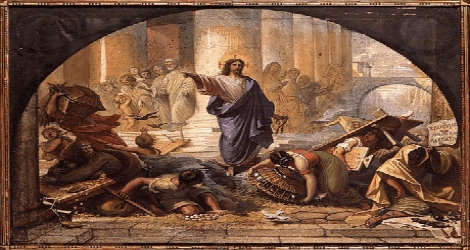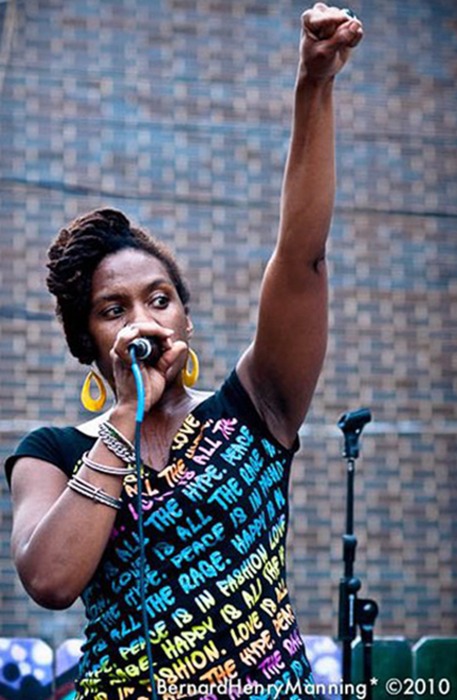Debating So-Called “Conscious Hip-Hop”
By Eric Roberts, co-creator of “Rhymes and Reasons” Hip-hop’s detractors, even casual listeners, forget that rapping is an artform, with formal considerations like any other. In the battle for airtime, so-called “conscious hip-hop” cannot use the virtue of its content as an excuse to neglect the rules of rhyming. The best rappers combine skillful wordplay with resonant imagery and a message that uplifts, challenges. The best rappers have touched the lives of the individuals for whom “Rhymes & Reasons” provides a forum to tell their stories. Read and print as PDF
Read and print as PDF

My partner Eddie, eager student of life and hip-hop, makes a distinction between “conscious hip-hop” and, well, everything else. Gangsta rap. Battle rap. Pop-rap. Anything comprised of a beat and a rap that doesn’t overtly have social justice in mind. It’s a distinction one hears a lot, usually from folks who don’t think of themselves as hip-hop fans, or “heads.” Hip-hop heads themselves, a rabid, singularly devoted group of people—I’m one—don’t always make the distinction, and we can often spot a non-head in someone who does. That’s because there’s a thin line between what separates so-called conscious hip-hop from the greater part of what we listen to.
But a line, nonetheless. Rappers like Lupe Fiasco, and before him, Common, Public Enemy, and X-Clan, stand out in the hip-hop landscape for the content of their lyrics, which takes on the social ills of the day. It is an important function, for it goes without saying that social ills are as prevalent as ever; that they are under-reported, unsung (if you like), and misunderstood; and that hip-hop’s core listenership, the original heads, are the children of legacies of injustice. For anyone who cares about the betterment of the world we live in, then, conscious hip-hop will always be the best hip-hop.
So why don’t we all listen to it, all the time, to the exclusion of those lesser forms? To answer that, I’ll make a distinction I consider far more important than the one Eddie makes—the basic artistic distinction between content and form.
___________________________________________
With apologies to A Tribe Called Quest, hip-hop is life… If we believe in social justice,
we, all of us, ignore hip-hop at our own peril.
___________________________________________
Eddie recently related something to me that happened at a forum he attended on hip-hop and social change at Northwestern University. Eddie had made the trek to the Chicago suburb of Evanston from the Back of the Yards neighborhood on the South Side to spread the word about our project, Rhymes & Reasons. One of the panelists, invited to speak on activism and hip-hop, was asked to define “conscious hip-hop.” The panelist was a little exasperated—clearly he’d been asked the question before. He placed the responsibility to define the term on the audience made up of presumed listeners.
“Name a conscious rapper,” he said.
“Talib Kweli!” someone shouted. Kweli is a Brooklyn rapper best known as one-half of the group Black Star, whose sole album Mos Def & Talib Kweli Are Black Star is a favorite among lovers of conscious hip-hop.
“Why does everyone always say Talib Kweli?” the panelist replied.
Indeed. Kweli (and for some reason, not Mos Def) is often held up as the quintessential conscious rapper, but primarily by non-heads. In fact, Kweli is not a popular or even relevant rapper. His last hit, in 2002, was “Get By.” As an anthem of upliftment, “Get By” reached iconic status. Kweli rapped, “Our activism attackin’ the system/The blacks and Latins in prison,” and, “Saturday sinners Sunday mornin’ at the feet of the Father/They need somethin’ to rely on.” On the Black Star album, Kweli’s most significant project to date, he and Mos Def critically examined materialism in hip-hop and extolled the natural beauty of African-American women—back in 1998.
It’s true that Kweli’s lyrics are topical. The dirty little secret is that Kweli is not a great rapper. His technique—his form—is poor. His words are often garbled, too many syllables pressed together into a single bar; his emphasis can sound forced and hollow; and rarely does he make us press rewind with a clever punchline or metaphor.
___________________________________________
We view the project Rhymes and Reasons as a means of ensuring the collective story of hip-hop is properly told, that all voices in the arena of discussion, conscious or not, get heard—and that whatever’s said is dope.
___________________________________________
While Kweli may lack certain essential qualities of a great rapper, he doesn’t want for sincerity—a big reason why he is so appealing to non-heads. He is a bleeding heart, full of rich content, with an unassuming posture. He is also fortunate to have rhymed over generally excellent production. “Get By” owed its success in large measure to pulsing production by Kanye West. Early in his career Kweli’s in-house producer was then-unknown DJ Hi-tek (they recorded together as Reflection Eternal), who later worked with 50 Cent and Dr. Dre.
One hallmark of a great rapper is a head’s ability, nay, overwhelming urge, to recite the rapper’s lyrics. Just as you’re always tempted, whether behind the wheel or on the treadmill, to sing along to your favorite songs, or to reprise them, whatever your own talent, in the shower or over the stove, a true head will know the lyrics of his favorite rappers, be possessed to rap them to himself, marveling their genius, and the genius in their original delivery, as he does so. If the lyrics are complex, he will listen to them over and over, trying to get them right. Ask the average Kweli partisan—a non-head—to recite his favorite Kweli verse and most of the time you’ll get dead air. He may be able to tell you what the verse is about, but isolate the perfect couplet, the bon mot that brings a smile to his face or raises the hair on his neck, he will not. But if he owns the Black Star or Reflection Eternal albums, he can most assuredly play you something to nod your head to.
Continue reading on next page…






Unbound Social